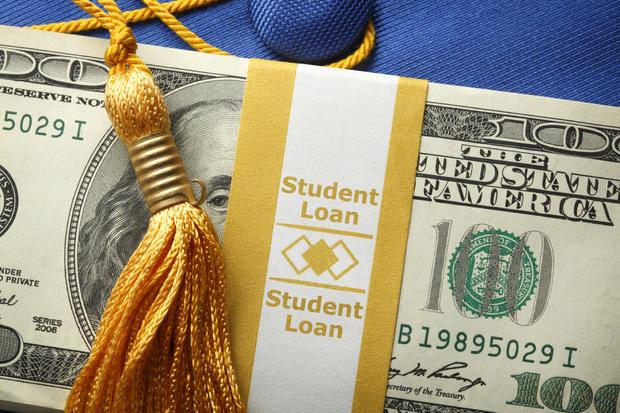We may receive a commission from links to products on this page. Promotions are subject to availability and retailer conditions.

Whether you are preparing to start a college career orseeking to continue your education in a graduate program Butit's important to get your finances in order early. Tuition, books, and other supplies can add up quickly.
If you don't have enough savings to pay these costs in full, consider taking out a student loan. Student loans allow you to borrow money from government or private lenders to pay for your studies, but you have to pay it back with interest and over time.
Learn more about student loans and how they workVisit our online marketplaceCompare lenders to find the wide variety of rates, terms and offers available today. increase.
You will typically first check eligibility for federal student loans through the U.S. Department of Education. These government loans come with several perks such as fixed interest rates, flexible payment plans and eligibility for loan forgiveness. You don't have to have a good credit score of or a signatory. To see if you meet the federal financial aid criteria, complete theFree Application for Federal Student Aid (FAFSA) form.
If you weren't approved for federal student loans or didn't receive enough financial assistance to cover all school-related expenses, don't worry. You can always go the private lender route.Here's what you need to know about private student loans.
How to Get Approved for Private Student Loans
Private student loans are offered through schools, banks, credit unions, or other financial institutions or agencies. will be Unlike federal student loans, private student loan interest rates can fluctuate. Private student loans have fixed or variable interest rates. This depends on the type of loan and the lender.
That's whyit's important to shop around for student loan lenders.You should check each lender's terms and conditions and the interest rates they offer.
To qualify for a private student loan, the following are important:
- Proof that you are 18 or older and a U.S. citizen
- High school Proof of having a diploma or GED
- Proof of college or university enrollment
- Proof of need for additional assistance from the school's Financial Assistance Office ( These offices typically require the lender)
- proof of meeting income requirements
good or good credit (if you do not have a strong credit score, have a co-signer ready) make sure it is there).
The National Foundation for Credit Counseling provides all the details you need to get approved for private student loans. However, if you are confident that you can check all the boxes above, you are more likely to receive a loan.
How to Apply for a Private Student Loan
When it comes to preparing to get a private student loan, the application process is straightforward. In fact, many online marketplaces walk you through the process
To apply for a student loan, know the following information::
- Personal Information: Be prepared to include your name, address, date of birth, phone number, email address, etc. (Bring your driver's license and social security).
- Tax returns: Make sure you have access to recent tax returns
- Proof of income, employment and savings: Recent W- 2. Have the form and other work-related documents, such as salary, on hand (if you don't have a W-2, make sure the signer has it). Also, be prepared to share your bank statements.
- List of Candidate Schools: Please be prepared to share a list of schools (up to 10) that you are interested in sending the FAFSA form to. Check the list of preferred lenders for each school
- Credit Score: Most private lenders require a credit check, so know your credit score and history
Otherwise, if you know what credit score range you're in, there are some resources you can take advantage of.Get your credit score in no time by answering a few simple questions
Once you have submitted all this paperwork, the lender will let you know when to approve or reject ( In some cases, it can be notified within a few minutes). Timing varies by lender.
Federal and Private Loans: What's the Difference?
The two most common types of student loans are federal and private. You should fully understand the differences between the two before choosing one.
Federal loans typically offer more perks than private ones, but private student loans also have some benefits, especially for those who don't qualify for assistance.
According to the Federal Student Aid Office of the U.S. Department of Education, here are the key takeaways for the two types of loans:
Federal Loan
- Interest Rate: Fixed Rate
- Credit History: No Credit Check Required
- Loan Forgiveness: In some circumstances, you may be eligible forLoan Forgiveness
- Payment Plans: Flexible, allowing you to change your repayment plan after getting a loan. Some federal loans also offer income-based repayment plans.
- Borrowing limit: Varies by eligibility. Determined by FAFSA
Private Loans
- Interest Rate: Floating or fixed rate available
- Credit history: Usually a credit check is required. A co-signer may be required if credit is not established
- Loan forgiveness: Not eligible for student loan forgiveness
- Payment plan : Varies by lender. Flexible options, but some require payment while student is still in school
- Borrowing limit: Varies by lender
Lower interest rates and more from private lenders You can receive good offers.
"Individual lenders may allow you to borrow larger amounts depending on your need and credit history. You may be able to find a lower interest rate compared to ,” the Consumer Financial Protection Authority explains on their website, but you can either fill out the FAFSA or the It states that other possible payment plans should be investigated.
Thank you for visiting CBS NEWS.
Create a free account or log in to
for more features.


